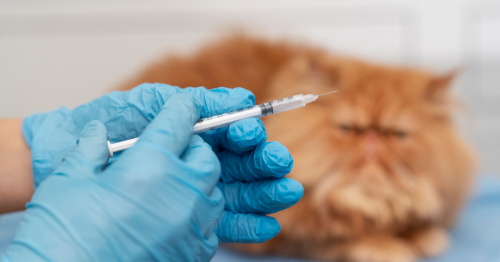O pâncreas desempenha papéis vitais na digestão e metabolismo de cães e é dividido em porção exócrina, responsável por secretar e sintetizar enzimas digestivas, e porção endócrina, que produz hormônios como insulina e glucagon1. Distúrbios nesse órgão podem levar a complicações sérias, afetando diretamente a saúde e o bem-estar destes animais. Dentre algumas das alterações pancreáticas comuns em cães estão a pancreatite e insuficiência pancreática exócrina (IPE).
A compreensão da fisiopatologia das doenças e o diagnóstico precoce é crucial, envolvendo exames laboratoriais e de imagem, além de uma avaliação clínica abrangente2. O tratamento convencional é normalmente baseado em terapias de suporte e a abordagem nutricional é utilizada como uma ferramenta fundamental para recuperação e melhora da qualidade de vida desses pacientes3,4,5.
O artigo completo está disponível na edição de janeiro de 2024.
Referências bibliográficas
- WILLIAMS, D. A. Diseases of the exocrine pancreas. In: BSAVA Manual of canine and feline gastroenterology. BSAVA Library, 2005. p. 222-239.LIDBURY, J. A.; SUCHODOLSKI, J. S. New advances in the diagnosis of canine and feline liver and pancreatic disease. The Veterinary Journal, v. 215, p. 87-95, 2016.
- WESTERMARCK, E.; WIBERG, M. E. Effects of diet on clinical signs of exocrine pancreatic insufficiency in dogs. Journal of the American Veterinary Medical Association, v. 228, n. 2, p. 225-229, 2006.
- MANSFIELD, C.; BETHS, T. Management of acute pancreatitis in dogs: a critical appraisal with focus on feeding and analgesia. Journal of small animal practice, v. 56, n. 1, p. 27-39, 2015.
- RAND, J. S. Diabetes Mellitus in Dogs and Cats. Clinical Small Animal Internal Medicine, p. 93-102, 2020.
- MANSFIELD, C. Acute pancreatitis in dogs: advances in understanding, diagnostics, and treatment. Topics in companion animal medicine, v. 27, n. 3, p. 123-132, 2012.
- XENOULIS, P. G. Diagnosis of pancreatitis in dogs and cats. Journal of small animal practice, v. 56, n. 1, p. 13-26, 2015.
- MANSFIELD, C.; BETHS, T. Management of acute pancreatitis in dogs: a critical appraisal with focus on feeding and analgesia. Journal of small animal practice, v. 56, n. 1, p. 27-39, 2015.
- MANSFIELD, C. Pancreatitis in the Dog. Clinical Small Animal Internal Medicine, p. 591-600, 2020.
- WESTERMARCK, E.; WIBERG, M. Exocrine pancreatic insufficiency in the dog: historical background, diagnosis, and treatment. Topics in companion animal medicine, v. 27, n. 3, p. 96-103, 2012.
- GERMAN, A. J. Exocrine pancreatic insufficiency in the dog: breed associations, nutritional considerations, and long-term outcome. Topics in companion animal medicine, v. 27, n. 3, p. 104-108, 2012.
- WESTERMARCK, E.; WIBERG, M. E. Effects of diet on clinical signs of exocrine pancreatic insufficiency in dogs. Journal of the American Veterinary Medical Association, v. 228, n. 2, p. 225-229, 2006.
- Cobalamin information. Texas A&M University Veterinary Medicine & Biomedical Sciences. Disponível em: https://vetmed.tamu.edu/gilab/research/cobalamin-information/. Acesso em: 07/12/2023.










